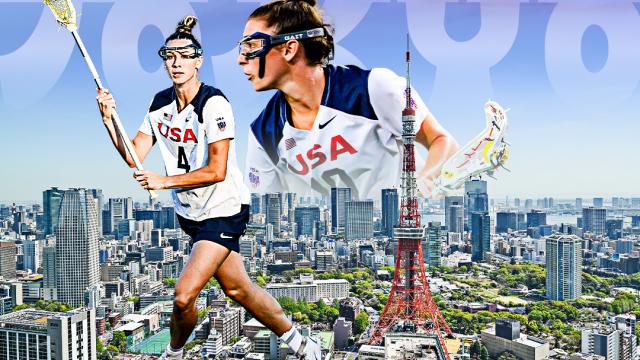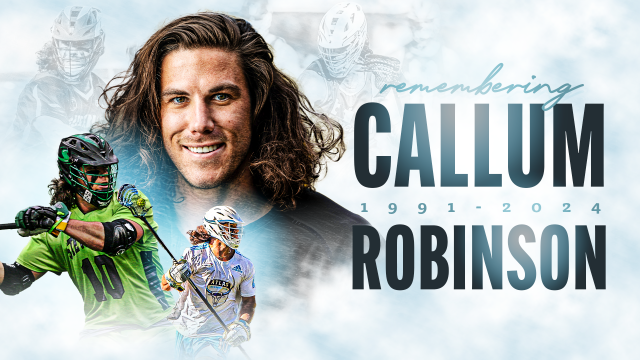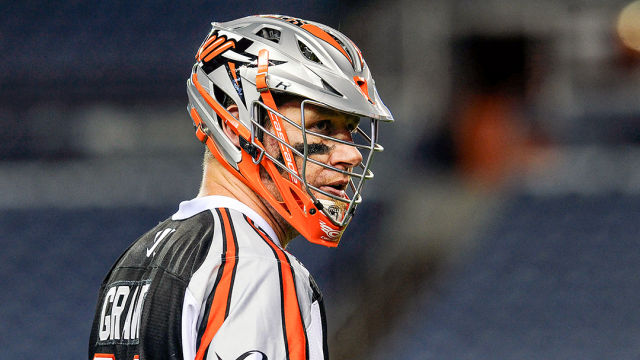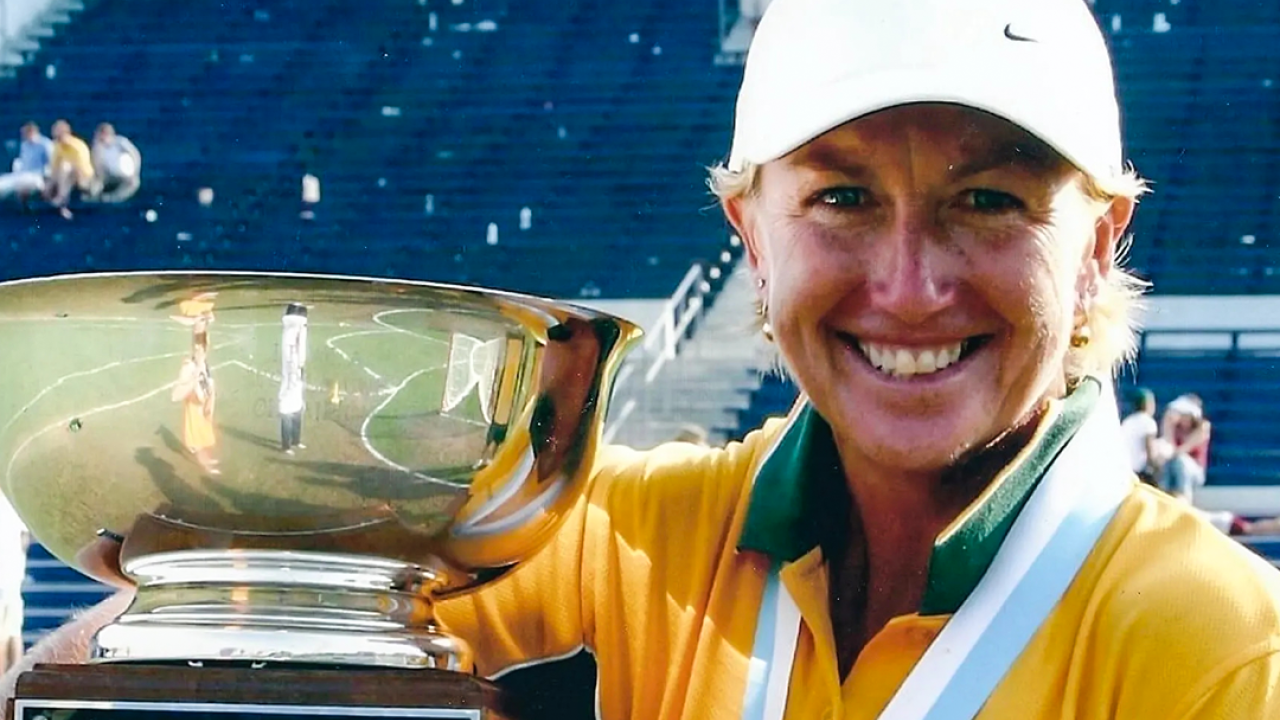
Playing for Melli: The Inspiration Behind Australia's World Championship Campaign
When Hayley Sofarnos arrived in the United States this week in preparation for the World Lacrosse Women’s Championship, the Williamstown, Australia native’s first stop was not her team hotel or her one-time stomping grounds at Penn State. Nor did she plan to link up immediately with Aussie transplants Sonia LaMonica or Jen Adams, both of whom coach at Baltimore-area colleges.
Instead, Sofarnos flew with her father and sister to Philadelphia, where Betsy Dougherty waited to whisk them away to her summertime residence in a Jersey Shore resort community — a Hall of Fame escort for the daughter of one of the most beloved and decorated figures in women’s lacrosse history.
“I’m really nervous to see Hayley,” said Dougherty, a three-time U.S. World Cup team member who was inducted into the National Lacrosse Hall of Fame in 2000. “When I see her and John and Jess, it’s going to make it real. I still can’t believe I’m not going to see Melli again.”
AN AUSTRALIAN LACROSSE ICON, Sue “Melli” Sofarnos died unexpectedly Sept. 19, 2020. She had just returned from an ocean swim and parked her car to drop off flowers for an elderly friend when she had a heart attack. She was 59.
Sofarnos played on five World Cup teams. She made the All-World team in 1982, won a gold medal in 1986 and was a three-time Australian team captain in 1989, 1993 and 1997. Sofarnos stayed on as a coach, serving as an assistant on the world champion 2005 team and leading Australia to a silver medal as the head coach in 2009.
Sofarnos was the general manager of this team — the one for which her daughter will finally play five years after tearing her ACL on the eve of the 2017 games in England.
“I still can’t believe she’s not here, to be honest. How am I functioning? My mom’s dead. It just happened one morning as we were heading to training. How your life can change in an instant,” Hayley Sofarnos said. “If you can ever find a silver lining, it’s in the way our team has come together around that in our shared loss and how we continue her legacy.”
Sofarnos’ legacy stretched far beyond Australia. She competed ruthlessly but loved generously.
On the field, Sofarnos was borderline mean.
“You didn’t want to get in her way,” Dougherty said.
Off the field, goofy as all get out.
“That’s how she did everything. It was passion,” Dougherty said of Sofarnos, whose silly side frequently manifested in spontaneous singing and dancing. “Competing against you, look out, she’s bringing it all. And if you’re partying with her, no doubt, she’s bringing it all.”
In a gesture that would seem almost unfathomable today, Sofarnos invited Dougherty to the Australian team celebration following their win over the U.S. in the 1986 World Cup final in Swarthmore, Pennsylvania. The two rivals struck up a friendship, spending time with each other’s families while on playing tours in the ensuing years. They talked about traveling the world together when they retired and their kids had grown.
Dougherty’s sister, Julie Williams, also played for the U.S. team when Sofarnos was in her prime as a player. They too grew close.
“Sue aka Melli is/was a dear friend,” said Williams, a 2002 National Lacrosse Hall of Fame inductee, in response to an email. “Hard to speak in past tense.”
Sofarnos never left anything unsaid — or unwritten. Hayley has a shoebox full of messages her mother scrolled in her loopy cursive to commemorate milestones or motivate her.
On a post-it note found in her laptop after she died, Sofarnos wrote in red ink, “Why am I here? What difference do I make? Why do I do what I do?” She answered with a series of adjectives others have since used to describe her. “Authentic. Caring. Compassionate. Service mindset.” And in all caps, “COMPETITIVE.”
Dougherty also has a handwritten note from Sofarnos, one wishing her friend good luck in the 1993 gold medal game after the U.S. knocked out Australia in the semifinals in Scotland.
“That is the sport defined,” Dougherty said.
LESS THAN 24 HOURS AFTER SHE DIED, Sofarnos’ family established a foundation in her name. Its goal: to financially support the Australian women’s national team so athletes no longer had to pay out of pocket for training, uniforms, travel and accommodations. A crowdfunding page raised more than $160,000 AUD (about $110,000 USD) in a matter of months.
At a fundraising event in March, John Sofarnos announced that 2022 team’s world championship campaign would be fully funded for the first time.
“Our house had turned into a florist. We were so overwhelmed with the care and compassion that everyone was giving. How do we channel this to be purposeful? Somehow my dad had the presence of mind to do that,” Hayley Sofarnos said. “We’ve raised enough money to fully fund the world championship team. And we leave the foundation in a sustainable place moving forward.”
“It was a terrible thing to happen, but something very amazing has come out of it,” said Kahli Evans, a goalie competing in her first world championship for Australia.
History is on Australia’s side in this world championship. Both of its gold medals — in 1986 and 2005 — came on U.S. soil. No host country has ever won the event.
And after failing to medal for the first time ever in 2017, the team will be plenty motivated.
“The Aussies love to be the underdog,” said Hayley Sofarnos, whose husband, Chris Plumb, plays for the Australian men’s national team. “Mom was such a stats person. I remember specifically in ’05 when they won, she did the calculations on the number of players that played in Australia versus the United States. That will have boomed even more now. For us to continue to punch above our weight like we do and produce quality over quantity, it makes it an exciting time. It’s cool to be back in Maryland with the good vibes of Annapolis just around the corner.”
Australia also possesses a unique blend of experience and youth.
Two members of the 2005 team are still with the program today. Stacey Morlang Sullivan, an All-World midfielder in 2005, 2009 and 2013, has returned as team captain after missing the 2017 cycle while raising three young children. Two-time Tewaaraton winner Hannah Nielsen is playing in her fifth world championship. That’s not to mention the incomparable Jen Adams, who is on the senior team coaching staff for the first time as an assistant to her sister, head coach Trish Adams.
The youth movement includes Steph Kelly (Rutgers), Georgia Latch (Loyola), Abby Thorne (Pitt) and Bonnie Yu (Saint Joseph’s) — all of whom had stellar 2022 seasons competing for NCAA Division I teams in the U.S. Madison Copeland, the 2019 U19 All-World team member and World Games Athlete of the Year nominee, could soon join them stateside.
All were connected to Sofarnos somehow. They’re all playing for Melli.
“It just has brought a different level to everything around this campaign,” Evans said.
When Evans revealed to the team during the early days of the pandemic that she was diagnosed with autism spectrum disorder, Sofarnos called immediately to express her support.
“She was like, ‘Thank you for being so vulnerable. This is what we want. I can’t wait to go on this journey with you. I can’t wait to give you a great big hug,’” Evans said. “Unfortunately, I never got that.”
Morlang Sullivan, who played for the late Diane Geppi-Aikens at Loyola, knows all too well what it’s like to lose a beloved coach — and how a team could be galvanized in its shared grief.
“She taught us about mateship and culture,” Morlang Sullivan said in a video tribute to Sofarnos produced shortly after she died. “She taught us that no matter how much effort you put in and how hard you worked on the pitch, it didn’t matter if you weren’t connected.”
Matt DaSilva
Matt DaSilva is the editor in chief of USA Lacrosse Magazine. He played LSM at Sachem (N.Y.) and for the club team at Delaware. Somewhere on the dark web resides a GIF of him getting beat for the game-winning goal in the 2002 NCLL final.
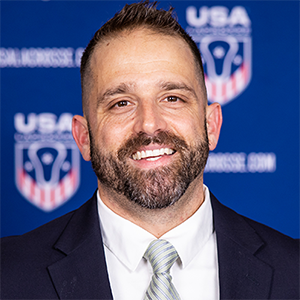
Categories
Related Articles
